|
|
|
Sort Order |
|
|
|
Items / Page
|
|
|
|
|
|
|
| Srl | Item |
| 1 |
ID:
084225


|
|
|
|
|
| Publication |
2008.
|
| Summary/Abstract |
The surviving documentation on Azimullah Khan is unreliable and fragmentary, but a survey suggests that his importance as a leader in the revolt of 1857 may have been exaggerated. His true distinction was as a consultant to the Nana Sahib. A unique personal letter from Azimullah, dating from the years that he spent in England and published here for the first time, reveals him at work behind the scenes on his master's behalf.
|
|
|
|
|
|
|
|
|
|
|
|
|
|
|
|
| 2 |
ID:
142756


|
|
|
|
|
| Summary/Abstract |
On the foundation of the first Jewish settlements in the Negev, at the start of the 1940s, the Bedouins welcomed the Jewish settlers. The local personal connections and mutual acquaintance between them created a feeling of closeness. The symbiosis of daily life and mutual help in the fields of personal needs, from medicine to transport, replaced their mutual fears.
However, two factors quickly changed this attitude. The first was a severe drought, which struck the Negev in the winter of 1947, and brought with it a difficult economic situation, followed by several robberies and disputes, and damage to property. The second factor was the incessant encouragement given by the leaders of the Palestinian National Movement to the Bedouins to join the struggle against the Jewish population, especially after the UN decision in November 1947, that is, after the partition of Palestine and the inclusion of the Negev within the borders of the Jewish state.
Most of the Bedouins joined the Palestinian National Struggle. Friends of yesterday became today's enemies. The years 1947–1949 were a period of anarchy, which continued well into the 1950s. In this period the State of Israel was established. Consequently, the Jewish population in the Negev was no longer the party responsible for the relationship with the Bedouins, as the Israeli government took its place. Also contact between neighbors was reduced after the Bedouins were evacuated toward the ‘fence’ region, in the Beer-Sheva Valley. The freedom the Bedouins enjoyed before the war did not exist anymore.
|
|
|
|
|
|
|
|
|
|
|
|
|
|
|
|
| 3 |
ID:
161289


|
|
|
|
|
| Summary/Abstract |
This article examines the impact of Brexit on British–Irish relations to date. Etain Tannam shows how the intergovernmental relationship has flourished, but highlights the challenges posed by Brexit. She argues that strong British–Irish intergovernmental relations are essential to manage the challenges. A formalised institutional framework is and will be essential in the absence of common EU membership. To this end, the Good Friday Agreement’s British–Irish Intergovernmental Conference should be revitalised.
|
|
|
|
|
|
|
|
|
|
|
|
|
|
|
|
| 4 |
ID:
181968
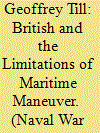

|
|
|
|
|
| Summary/Abstract |
Strategists who are turning to maritime maneuver to achieve their ends amid intensifying great-power competition should be aware that the British historical experience shows that—owing to its costs, challenges, and limitations—the approach most often has failed to deliver on its strategic promise.
|
|
|
|
|
|
|
|
|
|
|
|
|
|
|
|
| 5 |
ID:
088127


|
|
|
|
|
| Publication |
2009.
|
| Summary/Abstract |
This article examines the strategies pursued by the Australian Liberal-Country Party coalition governments of Robert Menzies and Harold Holt in their quest to secure a continuing British military presence in Malaysia and Singapore. It focuses on the first eighteen months of the Wilson premiership (October 1964-March 1966) when Labour's thinking on the future of Britain's defence role east of Suez was still fluid and had not yet crystallised into a firm decision to withdraw from "east of Suez." In doing so, the article considers whether both Menzies and Holt did all they could to encourage London to remain politically and militarily engaged in Southeast Asia. In addressing this question, this study provides an interesting insight into the conduct of post-war Australian foreign policy and the management of Australia's relations with its major allies, the United States and Britain.
|
|
|
|
|
|
|
|
|
|
|
|
|
|
|
|
| 6 |
ID:
093232
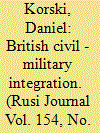

|
|
|
|
|
| Publication |
2009.
|
| Summary/Abstract |
British campaigns in Iraq and Afghanistan exposed a lack of institutional memory of the lessons of previous interventions. Twenty-first century security challenges have defied the traditional organisational boundaries within (and between) the military, civil service and government. Although there have been efforts to move towards the so-called comprehensive approach and create truly joint frameworks, the overhaul of government institutions has not been radical enough. A fresh, bold set of reforms is required to rework the institutions of state power to be effective in the present security environment
|
|
|
|
|
|
|
|
|
|
|
|
|
|
|
|
| 7 |
ID:
127119
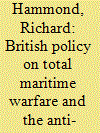

|
|
|
|
|
| Publication |
2013.
|
| Summary/Abstract |
During World War II, the British ran a sustained anti-shipping campaign against Axis merchant and supply traffic in the Mediterranean. Although the effects of this on the land war in North Africa have been the subject of much debate, little attention has been paid to the nature and prosecution of the campaign itself. This article analyses the changes in British attitudes and policy towards attacking merchant shipping prior to and throughout the campaign. It then goes on to examine the conduct of the campaign itself and compare it with other British efforts elsewhere during the war. It concludes that the anti-shipping campaign in the Mediterranean was a unique combined arms offensive for the British, and a major evolution in their attitudes and policy towards maritime total war.
|
|
|
|
|
|
|
|
|
|
|
|
|
|
|
|
| 8 |
ID:
093765
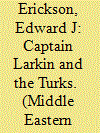

|
|
|
|
|
| Publication |
2010.
|
| Summary/Abstract |
The voyages of the HMS Doris along the Mediterranean coast near Alexandretta (modern Iskenderun, Turkey) in the winter of 1914-15 had a dramatic effect on the Ottoman Empire that far exceeded the scope of the operations. This article uses British, German, and Turkish archival sources to focus on the ship's operations in the vicinity of Dortyol and on the strategic impact these had on Ottoman perceptions of threats to the empire. The Doris figures prominently in two critical strategic outcomes - the relocation of the Armenians in 1915 and in the activation of three Ottoman army divisions for coastal defence and internal security.
|
|
|
|
|
|
|
|
|
|
|
|
|
|
|
|
| 9 |
ID:
086942


|
|
|
|
|
| Publication |
2009.
|
| Summary/Abstract |
In December 2006 the British government released a White Paper announcing its intention to begin the process of replacing its current Trident nuclear weapons system, thereby allowing it to retain nuclear weapons well into the 2050s. In March 2008 the government released its National Security Strategy that stressed the long-term complexity, diversity and interdependence of threats to British security with a clear focus on human rights, justice and freedom. This article asks how the threat to kill tens if not hundreds of thousands of people with British nuclear weapons fits into the National Security Strategy's world view and questions the relevance of an instrument of such devastating bluntness to threats defined by complexity and interdependence. It argues that the government's case for replacing the current Trident system based on the logic of nuclear deterrence is flawed. First, Britain faces no strategic nuclear threats and the long-term post-Cold War trend in relations with Russia and China-the two nuclear-armed major powers that could conceivably threaten the UK with nuclear attack-is positive, despite current tensions with Moscow over Georgia. Second, the credibility and legitimacy of threatening nuclear destruction in response to the use of WMD by 'rogue' states is highly questionable and British nuclear threats offer no 'insurance' or guarantee of protection against future 'rogue' nuclear threats. Third, nuclear weapons have no role to play in deterring acts of nuclear terrorism whether state-sponsored or not. Fourth, British nuclear threats will be useless in dealing with complex future conflicts characterized by 'hybrid' wars and diverse and interdependent sources of insecurity. The article concludes by arguing that the government's fall-back position that it must keep nuclear weapons 'just in case' because the future security environment appears so uncertain, makes no sense if British nuclear threats offer no solution to the causes and symptoms of that uncertainty.
|
|
|
|
|
|
|
|
|
|
|
|
|
|
|
|
| 10 |
ID:
079671
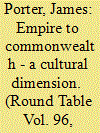

|
|
|
|
|
| Publication |
2007.
|
| Summary/Abstract |
This article reviews the contribution of the Imperial Institute and the Commonwealth Institute to the cultural understanding of the Empire and Commonwealth. It traces the shift in the focus of the Imperial Institute from the triumphal display of the British Empire at the end of the 19th century to the gradual portrayal of the life of individual countries in the first part of the 20th century. A new Commonwealth emerged from the struggle of the colonies for freedom and democracy. As a result, the Commonwealth Institute replaced the Imperial Institute in 1962. Although funded by the British government, it became closely associated with the aspirations of the newly independent Commonwealth nations and became a major centre for them to share their new cultural dynamism. In 2004 the Trustees decided to fund a Centre for Commonwealth research and training in the University of Cambridge. As a result the Institute building closed and its future use remains uncertain.
|
|
|
|
|
|
|
|
|
|
|
|
|
|
|
|
| 11 |
ID:
121834
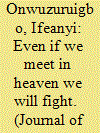

|
|
|
|
|
| Publication |
2013.
|
| Summary/Abstract |
Accepting that the Land Question was only limited to former settler colonies in Africa such as Kenya and Zimbabwe, dominant opinion in the literature has tended to trivialize the bitter struggles for land, many of which began during the colonial dispensation in many African nations. With globalization, democratization, structural adjustment and intensification of identity politics, many of these land conflicts have lingered. Yet studies of the conflicts, as in the case of Aguleri/Umuleri, have been scanty and almost ignore their historical and colonial roots. This paper explores colonial foundations of Aguleri/Umuleri conflicts, colonial policies designed to manage them and why they failed.
|
|
|
|
|
|
|
|
|
|
|
|
|
|
|
|
| 12 |
ID:
092466
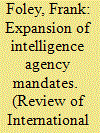

|
|
|
|
|
| Publication |
2009.
|
| Summary/Abstract |
The UK's domestic intelligence agency, MI5, has become increasingly involved in the realm of law enforcement over the last decade. This article puts the British experience in perspective by comparing it with France's main domestic intelligence agency, which has pushed deep into the law enforcement arena in recent years. A similar perception of Islamist terrorism underpins these parallel developments in the two countries. However, differences relating to accountability, legal systems and conceptions of the state mean that the French intelligence agency has expanded its role considerably more than its British counterpart. The analysis indicates that MI5's move into law enforcement is likely to remain a relatively conservative one.
|
|
|
|
|
|
|
|
|
|
|
|
|
|
|
|
| 13 |
ID:
085286


|
|
|
| 14 |
ID:
179023
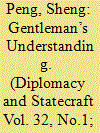

|
|
|
|
|
| Summary/Abstract |
British, French, and German Dual-Use Technology Transfer to China and America’s Dilemma during the Carter Administration, 1977-1981
|
|
|
|
|
|
|
|
|
|
|
|
|
|
|
|
| 15 |
ID:
174141
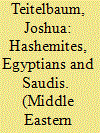

|
|
|
|
|
| Summary/Abstract |
Most analyses of the fate of the Hijaz and the Muslim pilgrimage after the First World War have focused on the struggle between Hashemites and Saudis. But in actuality the Egyptians were heavily involved in this dispute, for the Hijaz had been for centuries part of a geopolitical system based on the Red Sea littoral states. Indeed, this was a tripartite struggle, which afforded much more room for maneuver than a simple bilateral one. This article covers the maneuvers of all three parties, demonstrating how they tried to gain possession of the hajj, and all that meant for world Islamic leadership.
|
|
|
|
|
|
|
|
|
|
|
|
|
|
|
|
| 16 |
ID:
084240
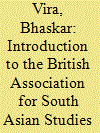

|
|
|
|
|
| Publication |
2008.
|
| Summary/Abstract |
This paper introduces the British Association for South Asian Studies special issue of Contemporary South Asia. Contributions to this volume have been made based on papers presented by participants at the 21st British Association for South Asian Studies Annual Conference held in Cambridge in March 2007. The papers in the collection reflect on different aspects of identity in the contemporary South Asian context, focusing on caste, religion, gender and tribe, and explore the relevance of these signifiers in the lived everyday experiences of these different communities, as well as their broader implications for the contemporary politics of the region.
|
|
|
|
|
|
|
|
|
|
|
|
|
|
|
|
| 17 |
ID:
171998


|
|
|
|
|
| Summary/Abstract |
British consuls were key agents for the British imperial presence in China from 1842 to 1943. Their role, which was to perform administrative duties that protected the rights of British subjects, is most prominently remembered in connection with the east coast. Here larger foreign communities and international maritime trade necessitated their presence. However, British consuls were also posted to the far southwest province of Yunnan and the Burma-China frontier region. This article sheds light on the role of consuls working in the little-known British consular station of Tengyue, situated close to the Burma-China frontier. Using the reports of locally stationed consuls and Burmese frontier officials, it argues that consuls were important mediators of legal power operating at the fringes of empire for British imperial and colonial interests in this region. They represented British and European subjects, and were mediators in legal disputes between British Burma and China, helping to smooth over Sino-British relations and promoting British Burmese sovereign interests. The article serves to shift our attention from the British presence in China on the east coast to the southwestern frontier, demonstrate the importance of consular legal duties, and emphasize the trans-imperial nature of British legal roles across this region.
|
|
|
|
|
|
|
|
|
|
|
|
|
|
|
|
| 18 |
ID:
108315
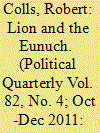

|
|
|
|
|
| Publication |
2011.
|
| Summary/Abstract |
The Lion and the Eunuch challenges the failures of British politicians to adequately understand the complexities, and the subtleties, of British national identity, and goes on to define it for them. It also explains reasons for our current confusions over who we are in the world. In 1940 Orwell wrote The Lion and the Unicorn as a rallying cry for a richly identifying country that was still able to imagine itself, and re-imagine itself, as the need arose. This essay suggests that without a radical change of government policy and thought, that power will continue to decline with far reaching consequences for the peoples of these islands.
|
|
|
|
|
|
|
|
|
|
|
|
|
|
|
|
| 19 |
ID:
166736


|
|
|
|
|
| Summary/Abstract |
In 2008, the government of the province of British Columbia (B.C.) broke new ground in North America by introducing a revenue-neutral carbon tax on fossil fuel use. The rate was initially set at $10/ton of CO2 and then raised annually by increments of $5 to reach $30/ton in 2012. We measure the impact of the tax on diesel users; these are primarily businesses involved in heavy industries, mining, construction, and commercial transportation, and they represent 18.2% of B.C. fossil fuel emissions. Based on a cointegration equation and a related error-correction model, we find that, over 2008–2016, the combined long and short run carbon tax impact has resulted in an average of 5.85 cent/litre increase at the pump, and a reduction of 1.24 L in monthly per capita diesel consumption. The average annual reduction amounts to 1.3% of B.C. 2008 diesel emissions and 0.2% of total emissions in the province in that same year. This decrease is relatively modest when we consider Canada's Paris Agreement commitment to reduce GHG emissions by 30% by the year 2030.
|
|
|
|
|
|
|
|
|
|
|
|
|
|
|
|
| 20 |
ID:
151465


|
|
|
|
|
| Summary/Abstract |
Revisionist historians of the Western Front have demonstrated that Britain had no alternative but to wage a war of attrition to defeat Germany. However, the effort to assess this process has been neglected in the historiography. This article explores British attempts to gauge the success of their strategy of wearing down German manpower. Efforts in London proved unable to supply a convincing answer. Using General Headquarters’ dubious estimates from the front, Field Marshal Sir Douglas Haig argued that his strategy was working. Prime Minister David Lloyd George’s inability to confound these estimates shaped his decision to permit the Passchendaele offensive.
|
|
|
|
|
|
|
|
|
|
|
|
|
|
|
|
|
|
|
|
|